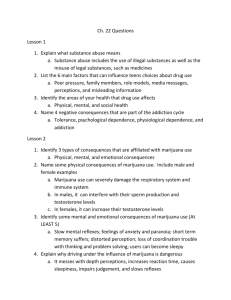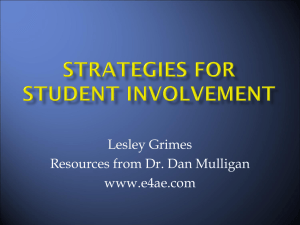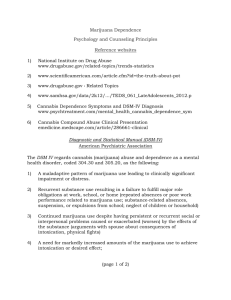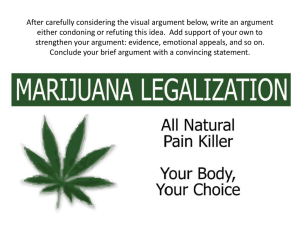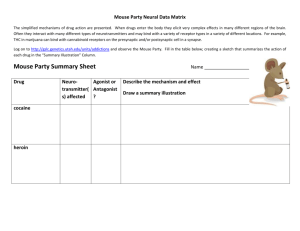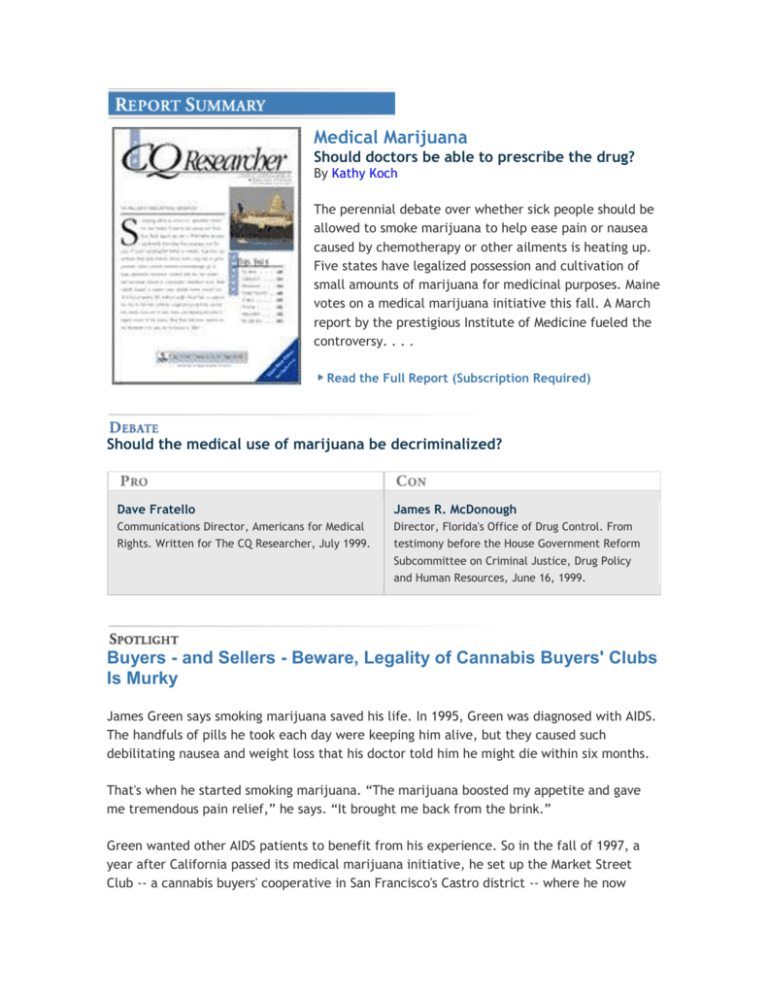
August 20, 1999
Medical Marijuana
Should doctors be able to prescribe the drug?
By Kathy Koch
The perennial debate over whether sick people should be
allowed to smoke marijuana to help ease pain or nausea
caused by chemotherapy or other ailments is heating up.
Five states have legalized possession and cultivation of
small amounts of marijuana for medicinal purposes. Maine
votes on a medical marijuana initiative this fall. A March
report by the prestigious Institute of Medicine fueled the
controversy. . . .
Read the Full Report (Subscription Required)
Should the medical use of marijuana be decriminalized?
Dave Fratello
James R. McDonough
Communications Director, Americans for Medical
Rights. Written for The CQ Researcher, July 1999.
Director, Florida's Office of Drug Control. From
testimony before the House Government Reform
Subcommittee on Criminal Justice, Drug Policy
and Human Resources, June 16, 1999.
Buyers - and Sellers - Beware, Legality of Cannabis Buyers' Clubs
Is Murky
James Green says smoking marijuana saved his life. In 1995, Green was diagnosed with AIDS.
The handfuls of pills he took each day were keeping him alive, but they caused such
debilitating nausea and weight loss that his doctor told him he might die within six months.
That's when he started smoking marijuana. “The marijuana boosted my appetite and gave
me tremendous pain relief,” he says. “It brought me back from the brink.”
Green wanted other AIDS patients to benefit from his experience. So in the fall of 1997, a
year after California passed its medical marijuana initiative, he set up the Market Street
Club -- a cannabis buyers' cooperative in San Francisco's Castro district -- where he now
dispenses marijuana to about 350 clients with written recommendations from their doctors
allowing them to use marijuana for medicinal purposes.
Perched on a stool behind the counter of his second-floor walk-up office, the auburnbearded 38-year-old snips excess stems and leaves off the “special of the day” -- Dutch
Treat. He then weighs and measures it into plastic ziplock bags that sell for $40 to $80 per
eighth-of-an-ounce dose. “I sell only the Cadillac, organically-grown varieties,” he points
out.
As he waits for clients to trickle in, Green has plenty of time to speculate on why Congress
has not legalized medical marijuana nationwide. Up to 75 percent of his customers are HIVpositive, he says. “I'm sure the fact that marijuana is used medicinally by AIDS sufferers
doesn't help in today's Congress, where some members believe AIDS is God's punishment for
the gay lifestyle.”
In the past three years, dozens of cannabis buyers' clubs have cropped up in California and
four other Western states that have legalized medical marijuana. But because the clubs
operate in a legal never-never land, Green doesn't allow any photographs of himself as he
weighs the drug. “Technically, what I am doing is against federal law,” he says.
Actually, what he is doing violates both federal and
state law. California's ballot initiative gave individual
patients or their caregivers the right to possess or
cultivate small amounts of marijuana for the patient's
own use. It did not legalize cannabis buyers' clubs,
which procure and sell large quantities of marijuana
for hundreds of patients.
San Francisco's elected officials have turned a blind
eye toward the clubs. But state officials have not.
The Oakland Cannabis Buyers' Cooperative is
Several clubs, both inside and outside of the city,
no longer dispensing medical
were raided and shut down by state narcotics agents
marijuana.(Photo Credit: Ben Margot,
Associated Press)
operating under orders from former Republican
Attorney General Dan Lungren. But since Democrat
Bill Lockyer took over from Lungren, the raids have stopped, at least for the moment.
In January 1998, however, the federal government sued six California cannabis clubs in civil
court. One was a popular, low-key establishment located across San Francisco Bay in
Oakland. Founder Jeff Jones operated the club much like a pharmacy, with checks and
double-checks to ensure that doctors' letters of recommendation were legitimate. He
bitterly vows to appeal the case to the U.S. Supreme Court if necessary.
While the case is pending, Jones cannot dispense marijuana. But he's still issuing
identification cards to patients after verifying that their doctors' recommendations are
legitimate. The patients can then use the cards at clubs that are still operating -- including
those in San Francisco, where District Attorney Terrence Hallinan has promised not to
prosecute club operators as long as they remain discreet and low-profile.
But the situation in other jurisdictions -- especially in rural areas without large numbers of
politically active homosexuals -- is murkier.
Most of the new state medical marijuana laws are silent on the question of how patients are
supposed to obtain the drug if they don't have the strength, room or inclination to grow it
themselves. So it has been up to local district attorneys and law enforcement officials to
decide how to implement the laws. And cannabis buyers' clubs, and the growers who supply
them, are clearly stretching the limits of the law.
Take the case of Kenneth Hayes, executive director of a San Francisco club called CHAMP
(Cannabis Helping Alleviate Medical Problems). Unlike the bare-bones, all-business
atmosphere at Green's club, CHAMP resembles a social club. Patients are allowed to smoke
marijuana as they lounge on couches amidst potted plants, posters and rock music. They can
also attend pot luck suppers, wellness discussion groups and yoga classes at the same time
they are picking up their weekly supplies of marijuana.
To supply the club's 1,300 members, Hayes planted 800 marijuana plants on his property in
Sonoma County, about 30 miles north of the city. Because he had 432 letters from doctors
saying the members could legally use marijuana, Hayes thought he was operating within the
law in growing grass for club members.
But Sonoma County law enforcement officials thought otherwise. On May 14 local and
federal narcotics agents raided Hayes' greenhouses, slashed all the plastic roofing to shreds
and ripped out the plants. The raid had been ordered by Sonoma County District Attorney
Mike Mullins, who said later, “I don't want Sonoma County to become the marijuana garden
for San Francisco.”
Hayes says he was particularly surprised because he had served on a task force set up by
Lockyer to help clear up ambiguities surrounding the implementation of the state's medical
marijuana law. “Mullins was on that panel with me,” Hayes says. “We sat across the table
from each other all year. So he knew I was director of CHAMP and the marijuana was being
grown for sick people.”
Under the task force's proposal -- which now is being considered by the state General
Assembly -- state health departments would verify doctors' letters of recommendation and
issue ID cards exempting medical marijuana users from arrest for possessing or cultivating
small quantities. It would also specify how much marijuana a “caregiver” may grow or
possess for a single patient. But cannabis club administrators would clearly not qualify as
caregivers. So the proposal still leaves the clubs operating in a legal gray area.
“Legitimizing the buyers' clubs was just one more bigger and more bitter pill for politicians
to have to swallow,” says Green. “No one is ready yet to bite that part of the bullet.” But
Green feels it is safe to keep providing marijuana to his members, as long as District
Attorney Hallinan keeps his job and his promise not to go after cannabis buyers' clubs within
the city.
But it may get harder to maintain a reliable source of uncontaminated marijuana if narcotics
agents continue to arrest the clubs' growers. In early August, one of Green's exclusive
suppliers was raided and shut down.
Across town, David Smith, founder of the Haight Ashbury Free Clinics, has a different view of
the cannabis buyers' clubs. He calls them “a street protest against failed federal policy
toward medical marijuana.”
Smith -- who says he is “anti-legalization of marijuana but pro-medicalization” -- sees more
marijuana-dependent adolescents in his clinics than almost anyone else in the country. But
he rejects the federal government's argument that if it legalizes medical marijuana
nationwide it will cause more youths to try the drug. “There is no relationship between
medical marijuana and cannabis dependency among young people, other than the fact that
it is all part of the same drug scene,” he says.
“That's why I'm a very strong advocate of separating the two worlds. Some of these clubs are
in the same area of town that is the center of our heroin epidemic,” he says. “Why would I
send a sick patient into that cesspool of needles, AIDS, black tar heroin and addiction?”
Instead, he says, “I'd like to be able to send an AIDS patient to a pharmacist, who would
dispense the drug in inhalers or suppositories. I want something that looks like medicine,
acts like medicine and is dispensed like medicine.”
[1] Quoted by Chris Smith, “Medical pot users plead for help,” The Press Democrat, June 16, 1999.
Document Citation
Koch, K. (1999, August 20). Medical marijuana. CQ Researcher, 9, 705-728. Retrieved from
http://library.cqpress.com/cqresearcher/
Document ID: cqresrre1999082000
Document URL: http://library.cqpress.com/cqresearcher/cqresrre1999082000
The CQ Researcher • August 20, 1999 • Volume 9, Number 31
© 2012, CQ Press, an Imprint of SAGE Publications. All Rights Reserved.
General Terms of Service | Copyright Notice and Takedown Policy | Masthead | Privacy Policy
© 2012, CQ Press, A Division of SAGE Publications. All Rights Reserved. CQ Press is a registered trademark of
Congressional Quarterly Inc.
Feedback | Suggest a Topic | Voluntary Product Accessibility Template®
General Terms of Service | Copyright Notice and Takedown Policy | Masthead | Privacy Policy




